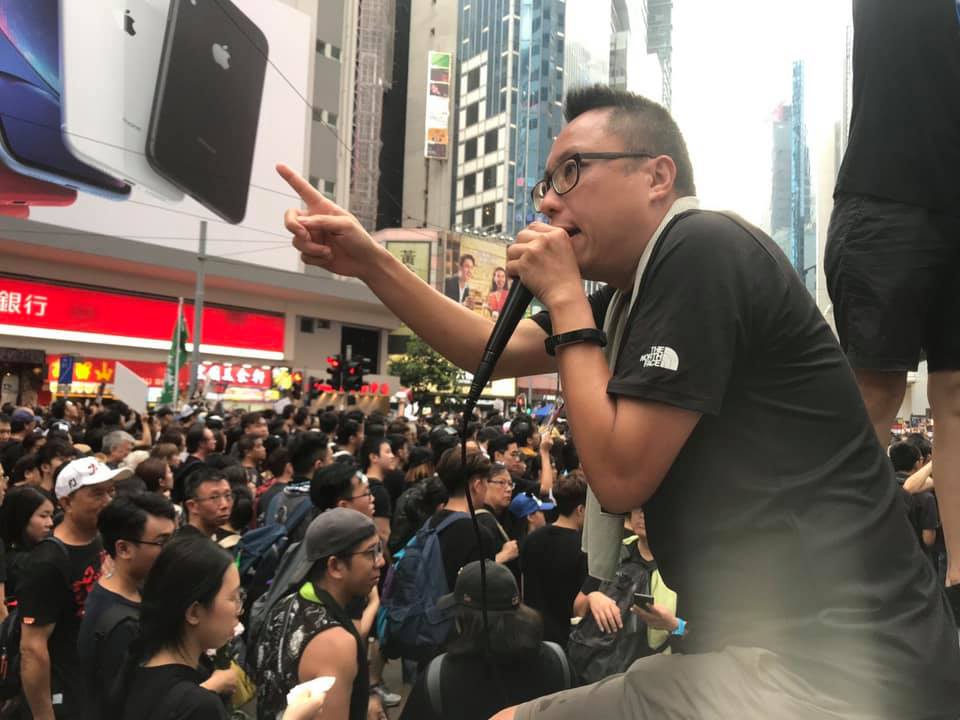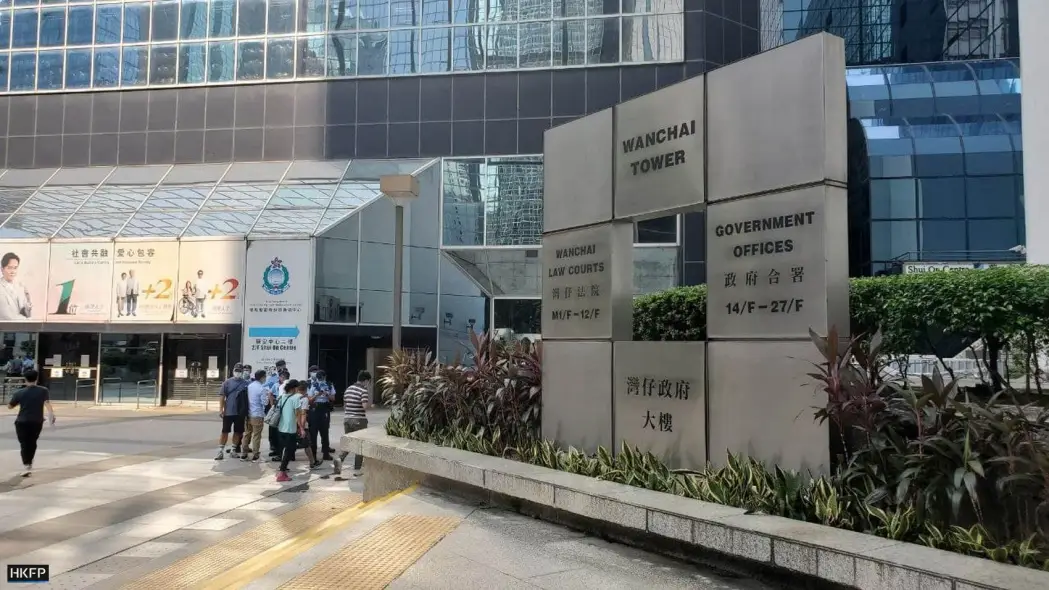Expert witnesses argued at length in a Hong Kong court about the meaning of a popular seven-word protest slogan as the trial of a pro-democracy activist accused of sedition resumed after an 11-week adjournment.
Tam Tak-chi, nicknamed “Fast Beat,” appeared in the District Court before Judge Stanley Chan on Monday after his trial was adjourned in July because of scheduling issues. Tam has been in custody for over a year after he was arrested in September 2020.

The activist faces 14 charges, including “uttering seditious words,” disorderly conduct in a public place, conspiracy to utter seditious words, holding or convening an unauthorised assembly, incitement to knowingly take part in an unauthorised assembly, and refusing to obey an order from an authorised officer.
He is charged under a colonial-era law against sedition.
Before the court session began, people in the public gallery made heart hand gestures and waved to the activist. Tam’s radio co-host, former lawmaker “Slow Beat” Raymond Chan, also attended the trial.
People shouted “You’re so handsome” to Tam, who at one point waved, pulled down his mask and smiled back.
The prosecution’s expert witness, historian Lau Chi-pang of Lingnan University, testified on Monday. Lau was also an expert witness in Hong Kong’s first national security law trial in which defendant Tong Ying-kit was jailed for nine years.
The historian testified about the meaning of the slogan “Liberate Hong Kong, revolution of our times,” which was first used by localist activist Edward Leung in 2016, and later popularised during the widespread anti-extradition bill protests in 2019.
The judge asked Lau whether Leung was the creator of the slogan, or whether he had popularised a phrase that had been circulating on the internet. Lau said that according to his research and Leung himself, the slogan originated with the activist.
Lau cited uses of the words “liberate” and “revolution” in Chinese history, including the Records of the Three Kingdoms written in the third century. He argued that the slogan has meanings including overturning the government and taking back Hong Kong from the enemy, as well as not recognising the current ruling regime in the city.

He said the two parts of the slogan should not be viewed separately, and the words “liberate” and “revolution” have the same meanings in ancient China and in modern days. The meaning of the slogan had not changed between Leung’s use of it in 2016 and the protests in 2019.
The prosecution played a video of one of Leung’s rallies in 2016 in court. The judge asked whether there was a need to play the video when it had already been accepted as evidence, and a transcript had been prepared.
“Why does the prosecution have to play this person’s political declaration in such a solemn criminal court?” asked Judge Chan.
Prosecutor Anthony Chau said the video was played to back up the historian’s testimony and there were other videos showing protests scenes and the use of the slogan. After a discussion between the prosecution and the defence, the remaining videos of Leung were not played.
The judge rebuked people waving to Tam from the public gallery after the court session was paused for discussion on the videos. He ordered cameras to be prepared to film people in the public gallery in case of “any chaotic situation” and said the courtroom “was not Temple Street.”

Senior Inspector Eddie Cheung said he had compiled a police report resulting from the viewing of over 2,000 videos of the protests in 2019 and 2020. It detailed the number of times the slogan “Liberate Hong Kong, revolution of our times” appeared, as well as the occurrence of violent incidents, the chanting of pro-independence slogans and other subversive events. Cheung did not disclose the numbers during his evidence.
Defence’s expert witness
Testifying for the defence, University of Hong Kong Linguistics Professor Janny Leung said she compiled part of her research for a report using Google. She searched the number of times the words “liberate” and “revolution” had been used in books published between 1800 and 2019, as well as the number of times “liberate” was entered in Google’s search engine in Hong Kong.

Chan questioned how representative Google’s databases were, as well as the point of analysing the data from its search engine.
The HKU scholar said over five million books were scanned in Google’s database, containing over 13 billion Chinese characters, and she “would argue [the database] has a great representativeness,” to which Chan said that “a large number does not equal to significance in meaning.”
Leung, rebutting the arguments of the historian Lau, said she did not think it helpful to study the meaning of a word a thousand years ago when trying to understand its meaning in a modern-day context.

She argued that the use of word “liberate” since 2012 targeted specific social issues, and that while Lau’s definition of the word might be a possibility, “liberate” could also mean to improve a situation or to stop a problem.
On the meaning of “revolution,” Leung said it did not definitely mean the overthrow of a regime, and the use of the word was common in elections.
The scholar also said that she did not agree with Lau’s explanations. “Liberate” and “revolution” could have very broad meanings and may refer to spiritual change instead of actual, physical changes.
While those who chant the slogan might have some thoughts on Hong Kong issues, they might not share the same thoughts, Leung argued. The trial will continue on Tuesday, when the prosecution is expected to cross-question her.
Support HKFP | Policies & Ethics | Error/typo? | Contact Us | Newsletter | Transparency & Annual Report | Apps
Help safeguard press freedom & keep HKFP free for all readers by supporting our team

LATEST FROM HKFP
HKFP has an impartial stance, transparent funding, and balanced coverage guided by an Ethics Code and Corrections Policy.
Support press freedom & help us surpass 1,000 monthly Patrons: 100% independent, governed by an ethics code & not-for-profit.










